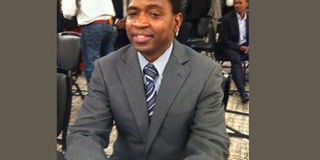Simba Wanyika: The band that the Kinyonga brothers created

Musician Abbu Omar, formerly of Simba Wanyika. PHOTO | FILE
What you need to know:
- Simba Wanyika was at one time one of East Africa’s most exciting musical bands.
- It had its origins in Tanzania, but made its fame and fortune in Kenya with a string of hit songs.
- They played at famous Nairobi night spots and recorded, before later moving to Mombasa.
Simba Wanyika was at one time one of East Africa’s most exciting musical bands. It had its origins in Tanzania, but made its fame and fortune in Kenya with a string of hit songs. Now, the story of the band has been immortalised in a new book, Abbu Omar: Maisha Yangu na Bendi za Wanyika.
The book is written by a former band member, Tanzanian Abbu Omar. It is currently available in the Kiswahili version, which was launched recently in Dar es Salaam. The English translation will soon be unveiled in Nairobi.
Abbu Omar describes his association with the founders of Simba Wanyika band, brothers George and Wilson Peter. The brothers moved to Kenya in 1972 and formed Simba Wanyika.
They played at famous Nairobi night spots and recorded, before later moving to Mombasa. The band is remembered for songs such as Halleluhya and Sina Makosa (I’ve done nothing wrong), now a worldwide hit that has been covered by many top musicians.
THE BAND
Abbu Omar first came to Nairobi in 1981 and joined Simba Wanyika. It was then based at the Bombax Club on Ngong Road. During a recent interview with the Saturday Nation, Abbu recalled how he was welcomed by Charles Ray Kassembe.
Kassembe, formerly with legendary Mbaraka Mwinshehe’s Super Volcano Band, introduced him to the Kinyonga brothers.
“It was my first time to meet them and I joined the band as rhythm guitarist,” he says.

Wilson Peter on stage. PHOTO | FILE
By then the two brothers Wilson and George had reconciled, with the latter returning to the band after a stint with Jobiso band from 1979 to 1980.
Then, Kassembe was leading the splinter Les Volcano band, which featured other Tanzanian musicians such as Mohammed Mwinjuma ‘Mazingazinga,’ William Muhina and Robert Mtinange. Kassembe is best remembered for songs like Kukataliwa ni Kubaya and Dawa ya Mapenzi.
In his book, Abbu reveals the controversies, sibling rivalry and eventual reconciliation of the talented brothers.
Wilson, the elder brother, was more versatile in compositions and the guitar while George was better in melody, vocals and arrangements.
Unknown to many fans, it was George Peter who arranged the vocals of the original Sina Makosa song, which guitarist and composer ‘Prof’ Omar Shaban had composed with Simba Wanyika band before it split in November 1978.
“Omar confided to most of us in the Wanyika group that the song was a true story about his rivalry with a senior Kenyan government official over a girl,” says Abbu.
The government official allegedly sent his juniors to physically harass the musician at a Nairobi hotel.
Sina Makosa was the first big hit by Les Wanyika. It was released in 1978. The lead vocals were done by the baritone voiced Issa Juma Singano. Others in Les Wanyika were John Ngereza, Tom Malanga, Rashid Juma, Tchou Tchou Betanga and Phoney Mkwanyule.
Les Wanyika would become the most notable of the offshoots from Simba Wanyika.
Abbu tells of how the fan base shifted from Simba Wanyika to Les Wanyika and other splinter groups.
The Kinyonga brothers were enraged by Omar Shaban’s decision to quit and releasing the jibe track Sikujua Utabadilika (I didn’t know you would change).
In 1979, brothers George and Peter parted ways musically with George forming Jobiso band.
Prior to coming to Kenya, the Kinyonga brothers had made their debut in the late 1960s with Jamhuri Jazz Band that was based in Tanga.

George Peter on stage. PHOTO | FILE
POPULARITY
The group was rivalled in popularity by the Atomic Jazz that featured controversial musician John Kijiko. This is the group Mbaraka Mwinshehe Mwaruka briefly joined after leaving the Morogoro Jazz Band before later forming Orch Super Volcano.
Abbu has interviewed several former band mates of the Kinyonga brothers who lived in Tanga.
“I took time to talk to various former musicians and local administrators to give me an insight into the band,” Abbu says.
Jamhuri Jazz band was famed for songs like Shingo la Upanga, Simba Mwituni, Wasiwasi Ondoa and Shangazi Naombai Taiiti.
The two brothers left Jamhuri Jazz to form Arusha Jazz in 1972. The initial group also featured Kombo Mkwana and a Kenyan, Ally Magombeni.
Arusha Band moved to Nairobi in June 1972 for one month before relocating to Mombasa.
Abbu explains in his book how conditions were rather tough for the Arusha team in Nairobi, forcing them to relocate to Mombasa, where the group changed its name to Simba Wanyika.
To reinforce the band, the brothers recruited ‘Prof’ Omar Shaban, Tom Malanga, Joseph Just and Elis John.
Other offshoots of the original Simba Wanyika included Orch Vina Vina, Super Wanyika, Golden Sound, Sigalame System, Everest Kings, Mavalo Kings, Les Moto Moto and Mas System.
Most Swahili rhumba bands of the 1980s and 1990s had at least a musician who had passed through one of the Simba Wanyika offshoots.
George Peter died on December 25, 1992. Wilson Peter died in August 1995.





